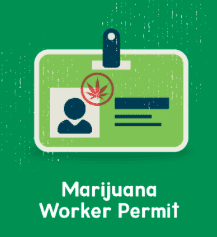
Last week we wrote about the final, permanent rules for the Oregon Liquor Control Commission’s (OLCC) recreational marijuana program. In that post, we mentioned that all cannabis business employees must hold a marijuana worker permit, not just retail employees. We also mentioned that information about the permit testing and licensing process was not yet available.
This week, it is.
The OLCC page on marijuana worker permits is here and the FAQ page is here. For a trio of high level points: (1) the permit requirement applies even to seasonal workers like marijuana trimmers; (2) all workers are subject to background checks (a felony automatically disqualifies); and (3) the permit requirement does not apply to anyone working in the Oregon Health Authority’s Medical Marijuana Program, or to lab and research certificate employees. In fact, there do not appear to be any credentialing requirements on the horizon for employees in those spaces.
The OLCC is also requiring potential permittees create an online account and take and pass an online exam. I took the test last night: it involves 30 multiple choice questions, some of which have incorrect answers that should make applicants smile: e.g., yes, it is alright to sell marijuana to old people; no, it is not alright to use marijuana on site to demonstrate how a product works. The test is a minimum competency offering: 21 correct answers (70%) counts as a pass.
Despite the “fun” wrong answers, the test does require familiarity with each level of the Oregon recreational cannabis program, from seed to sale. Before sharpening their pencils, applicants are encouraged to study the permit education workbook, available in English and Spanish. The workbook contains some provisions important for employers. Specifically, beginning on page 8, the section called “Violations and Sanctions” lays out a remarkably intricate 5-tiered system for sanctions based on the severity of violation. The bottom of page 9 reveals the following:
The OLCC typically cites its licensees and permittees administratively. Administrative sanctions will affect your permit and/or your employer’s license, but have no criminal consequences attached to them. However, the fact that the OLCC issues an administrative violation does not protect you or your employer from criminal or civil liability. Certain violations may warrant criminal prosecution as well. In some cases (particularly those involving sales to a visibly intoxicated person or to a minor that result in injuries), permittees and licensees can also face civil liability. Therefore, it is extremely important to follow all the rules at all times. If you ever have any questions about whether you are compliant, contact your local OLCC office for direction or further training, if needed.
This is key information for a couple of reasons. First, employers may be liable for employee/permittee conduct — with both civil and criminal consequences. This means business owners are clearly vested in ensuring employee compliance. Second, the consequence of most violations is administrative sanctions. That particular stripe of state action is very hard to fight: unless a defendant can show that OLCC has acted “arbitrarily and capriciously” in its censure, an administrative law judge will likely uphold the sanction without batting an eye. For these reasons, employers should be very keen on compliance, and they should develop internal policies as to perceived employee violations of OLCC rules. We can help with that.
OLCC will begin issuing permits on September 1, but in the meantime, all OLCC licensees are still required to use the Cannabis Tracking System to register their employees. Once permits issue, each newly minted permittee must pay a $100 fee and renew his or her non-transferrable permit every five years. For now, all OLCC marijuana businesses should share this program information with current and prospective employees, to safeguard against business interruption.
Compliance is king.

























